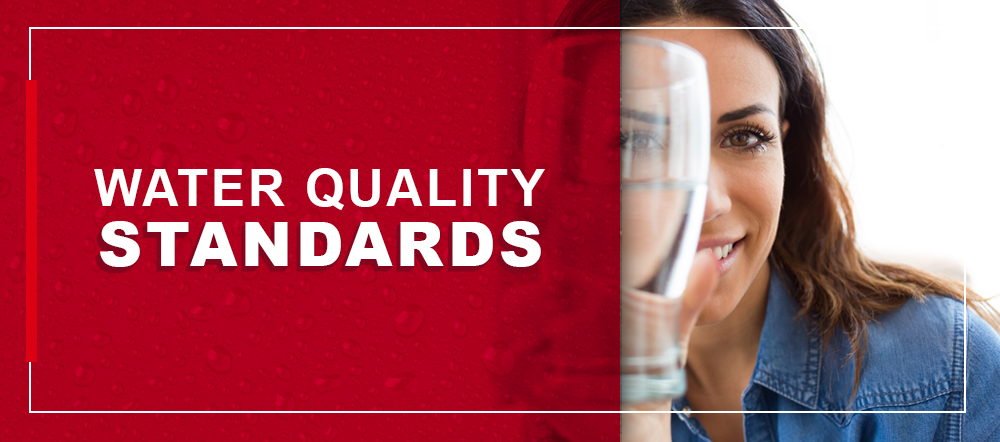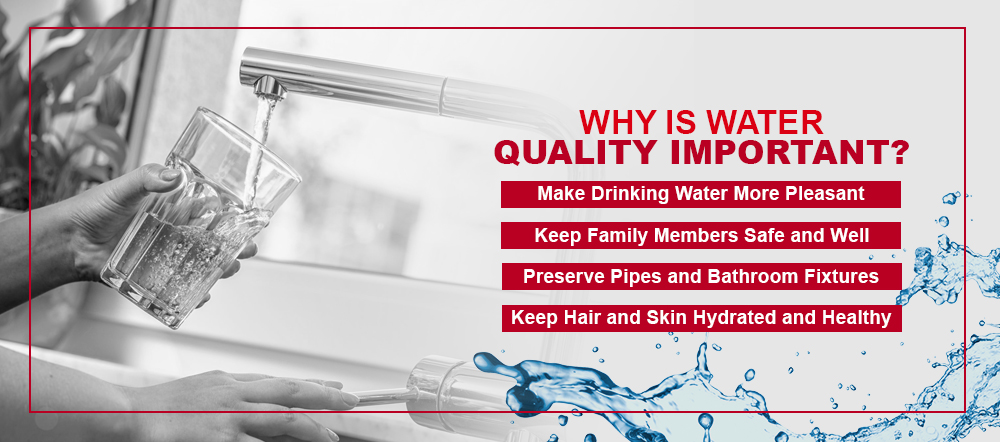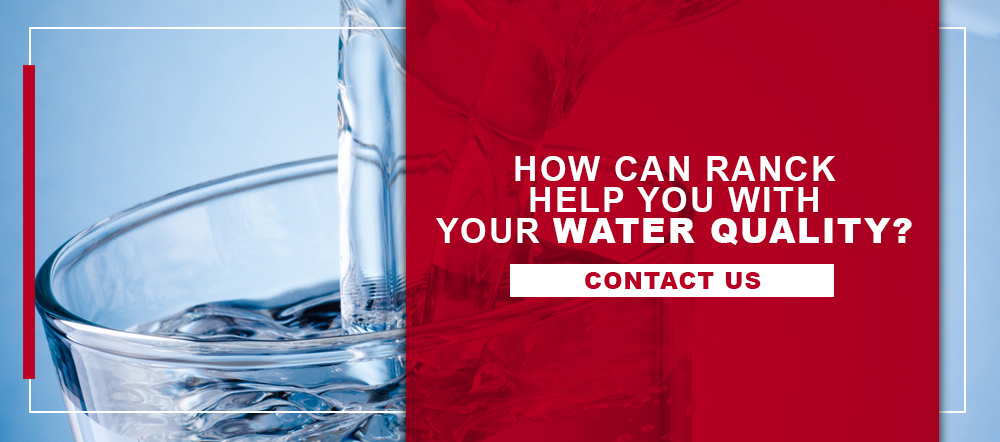
Water Quality Standards
When you’re thirsty, nothing beats a glass of clear, refreshing water from the tap. And when you’re tired and sweaty after a long day, a warm, refreshing shower is just the thing.
However, your drinking and bathing water may not be as clean as you think. Home water is susceptible to a tremendous array of contaminants. Pesticides, herbicides, agricultural waste, household cleaners, vehicle emissions, bacteria and viruses, heavy metals like lead and iron, even the chemicals from rocket fuel in certain areas — all these can make it into your home’s water and diminish its quality.
Even substances like chlorine, which cities often add to their water for its beneficial disinfecting properties, can decrease the quality of your water by giving it a harsh taste and smell. Chlorine can also react with organic matter to form more potent pollutants like trihalomethanes, which have been associated with cancer growth and reproductive issues at high levels.
What Are the Qualities of Good Water?
Water quality standards exist to regulate some of the chemicals in household water to make it cleaner and safer. Good water generally has these qualities:
Pleasant Smell
Good water should have a neutral, clean smell, not a metallic or otherwise noticeable one. Water that smells metallic likely contains a high concentration of iron, and bad smells can also indicate high levels of chlorine and or chemical contaminants.
Clean Taste
Similarly, good water should taste clean and refreshing. As with smell, a metallic taste can indicate the presence of iron or other heavy metals, and an unpleasant taste generally can be a sign of other contaminants. A noticeable tang can also indicate that your home’s water is hard.
Clear Appearance
Good-quality water should also look clear to the eye. It should not contain cloudy sediment or a colored tinge. A cloudy appearance can be a sign of hard water, or in rarer cases, it can indicate the presence of harmful methane gas.
Softness
Good water is also soft. When it comes to water quality, hardness refers to water that contains high concentrations of calcium and magnesium ions. Hard water causes a range of problems, from soap scum in the shower to dry, itchy skin to dull hair that feels weighed down with residue. Hard water can also cause a white, scaly mineral buildup on your faucets and shower heads.
No Stains or Buildup
Good, quality water should be clear and flow through your faucets without leaving anything behind. Water that leaves rust-colored stains likely contains heavy metals. And water that causes significant scale buildup may be hard or may contain other contaminants besides calcium and magnesium.
Why Is Water Quality Important?
Water quality in the home is important for a variety of reasons. High-quality water can help:
Make Drinking Water More Pleasant
We’re supposed to drink water throughout the day to stay healthy and energized. But bad-tasting or smelly water can make the idea of keeping hydrated less appealing. Who wants to spend a fortune on plastic water bottles that will only pile up in landfills? Good-quality water tastes crisp and refreshing and comes right from the tap, so staying hydrated is easy and enjoyable.
Keep Family Members Safe and Well
Poor quality water often comes from chemical contaminants, heavy metals and microorganisms that can adversely affect our health. Bacteria like Giardia and Cryptosporidium can creep into well water and cause gastrointestinal illnesses, and heavy metals like lead cause a host of issues, including impaired neurological development in children. Keeping your water quality high helps you avoid issues like these.
Preserve Pipes and Bathroom Fixtures
Heavy metals like iron often leave unsightly red stains on bathroom sinks and tubs. They can also cause heavy scale deposits on pipes and faucets. Good-quality water helps you preserve your pipes and bathroom fixtures and keep them looking bright and sparkly as new.

Keep Hair and Skin Hydrated and Healthy
Especially if your home has hard water, your hair and skin might be feeling the effects of poor water quality. The calcium and magnesium present in hard water can form an unwelcome film on your skin and hair, leaving your skin dry and itchy and your hair dull and greasy-feeling. But improved water quality can give you lighter, cleaner-feeling hair and soft, comfortable skin in no time.
What Are Water Quality Standards?
Quality water standards are used to measure the suitability of water for a particular use, based on its chemical, physical and biological properties.
For many household use purposes, the quality of the water coming in needs to be relatively high. If your home tap water contains pesticides and herbicides, your garden won’t mind being watered with it, and it’s fine for washing your car or hosing off a muddy bicycle. But for drinking, bathing and cooking, households need clean, quality water to keep everyone healthy and safe.
Through the Safe Drinking Water Act, passed in 1974, the EPA regulates a number of contaminants commonly found in drinking water and has established maximum levels at which they may be present. Plus, some individual states and municipalities have established their own more stringent regulations.
For example, the EPA’s maximum contamination level (MCL) for fluoride in drinking water is four parts per million, but Pennsylvania has established an MCL of two parts per million for fluoride to ensure better protection of their state’s residents’ health.
It’s important to note, though, that more than 60,000 chemicals are in use in the united states — but the EPA regulates only 91 of them. For this reason, it’s a good idea to get your water checked, especially if you use well water, which is not subject to regulation under the Safe Drinking Water Act.
How Often Should You Get Your Water Checked?
It’s always a good idea to get your water checked, so you have a clear idea of what impurities and contaminants are in it. That way, if you’re thinking of getting a filtration system, you can choose one that’s optimized for the specific biochemical composition of your home’s water.
It’s a good idea to get your water checked periodically, especially if it has an odd taste or smell or cloudy appearance. These signs could be harmless, but it’s best to have an expert assess the situation. Even if you think your water is fine, it’s always best to know for sure.
If your water comes from a municipal source, you can receive a free water quality report each year. That said, the report’s information will cover only the condition of the water as it leaves the city facility, not the condition it arrives in from your faucet. If you are worried about lead or other metals leaching into your water from your pipes, — or about any other type of organic, mineral or chemical contaminant — getting your water tested once a year or so is an excellent idea.
If your home has well water, the EPA encourages testing every year for coliform bacteria, the bacteria found in fecal waste. Test every year for nitrates, total dissolved solids and pH level as well.
If you use well water and are expecting a new baby in your household, it’s vital to have your water supply tested for nitrates, since these can cause an oxygen deficiency in infants. With an infant on the way or in the house, you should test your water more than once a year — and do the same if you experience unexplained illnesses or notice a deterioration in your water quality.
Otherwise, you should test well water for chloride, sulfate, manganese, iron and water hardness every three years.
How Can Ranck Help You With Your Water Quality?
When you want to improve the quality of your home’s water, let Ranck Plumbing, Heating & Air Conditioning help you find the right clean water solution. We offer high-quality water softening services, and we can also help you address issues like chlorine in your water or heavy metal contamination from your pipes.

We are a locally owned business with the years of experience necessary to get the job done right the first time. You and your family can have the peace of mind of knowing your water is safe and healthy.
Contact us today to schedule an appointment.